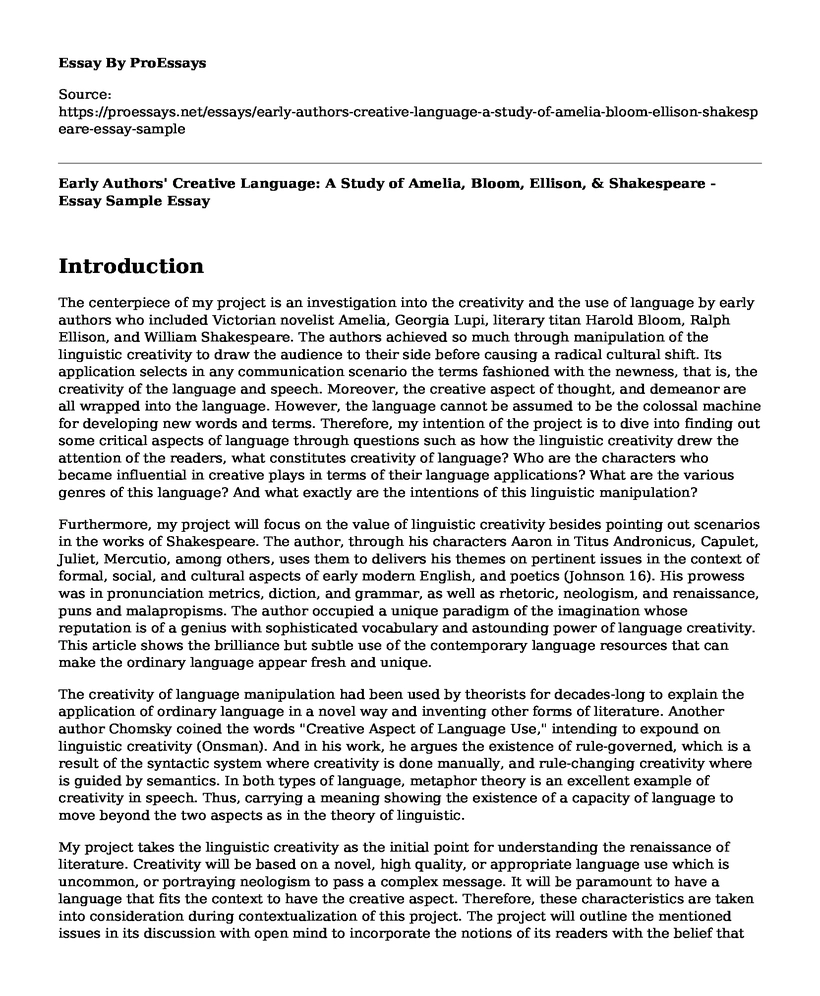Introduction
The centerpiece of my project is an investigation into the creativity and the use of language by early authors who included Victorian novelist Amelia, Georgia Lupi, literary titan Harold Bloom, Ralph Ellison, and William Shakespeare. The authors achieved so much through manipulation of the linguistic creativity to draw the audience to their side before causing a radical cultural shift. Its application selects in any communication scenario the terms fashioned with the newness, that is, the creativity of the language and speech. Moreover, the creative aspect of thought, and demeanor are all wrapped into the language. However, the language cannot be assumed to be the colossal machine for developing new words and terms. Therefore, my intention of the project is to dive into finding out some critical aspects of language through questions such as how the linguistic creativity drew the attention of the readers, what constitutes creativity of language? Who are the characters who became influential in creative plays in terms of their language applications? What are the various genres of this language? And what exactly are the intentions of this linguistic manipulation?
Furthermore, my project will focus on the value of linguistic creativity besides pointing out scenarios in the works of Shakespeare. The author, through his characters Aaron in Titus Andronicus, Capulet, Juliet, Mercutio, among others, uses them to delivers his themes on pertinent issues in the context of formal, social, and cultural aspects of early modern English, and poetics (Johnson 16). His prowess was in pronunciation metrics, diction, and grammar, as well as rhetoric, neologism, and renaissance, puns and malapropisms. The author occupied a unique paradigm of the imagination whose reputation is of a genius with sophisticated vocabulary and astounding power of language creativity. This article shows the brilliance but subtle use of the contemporary language resources that can make the ordinary language appear fresh and unique.
The creativity of language manipulation had been used by theorists for decades-long to explain the application of ordinary language in a novel way and inventing other forms of literature. Another author Chomsky coined the words "Creative Aspect of Language Use," intending to expound on linguistic creativity (Onsman). And in his work, he argues the existence of rule-governed, which is a result of the syntactic system where creativity is done manually, and rule-changing creativity where is guided by semantics. In both types of language, metaphor theory is an excellent example of creativity in speech. Thus, carrying a meaning showing the existence of a capacity of language to move beyond the two aspects as in the theory of linguistic.
My project takes the linguistic creativity as the initial point for understanding the renaissance of literature. Creativity will be based on a novel, high quality, or appropriate language use which is uncommon, or portraying neologism to pass a complex message. It will be paramount to have a language that fits the context to have the creative aspect. Therefore, these characteristics are taken into consideration during contextualization of this project. The project will outline the mentioned issues in its discussion with open mind to incorporate the notions of its readers with the belief that they may hold different views of linguistic creativity.
Works Cited
Johnson, Keith. "Shakespeare's Language." Routledge Taylor & Francis Group (2017): 108. Print.
Onsman, Hj. Creativity and linguistic theory: a study of the creative aspect of language. 17 08 2017. Web. 08 04 2020.
Cite this page
Early Authors' Creative Language: A Study of Amelia, Bloom, Ellison, & Shakespeare - Essay Sample. (2023, May 16). Retrieved from https://proessays.net/essays/early-authors-creative-language-a-study-of-amelia-bloom-ellison-shakespeare-essay-sample
If you are the original author of this essay and no longer wish to have it published on the ProEssays website, please click below to request its removal:
- I Know Why the Caged Bird Sings
- The Overall Synopsis of the Book
- Essay on Medieval Literature - Chaucer and Boccaccio
- Ideas of Appearance and Illusion in Othello Play Essay
- Literary Analysis Essay on Phoniness and Authenticity in The Catcher in the Rye
- Critical Essay Sample on The Open Boat: Nature's Inevitable Reign Over Human Destiny
- Essay Sample on Fear & Pride: Jack's Conquest in Lord of the Flies







